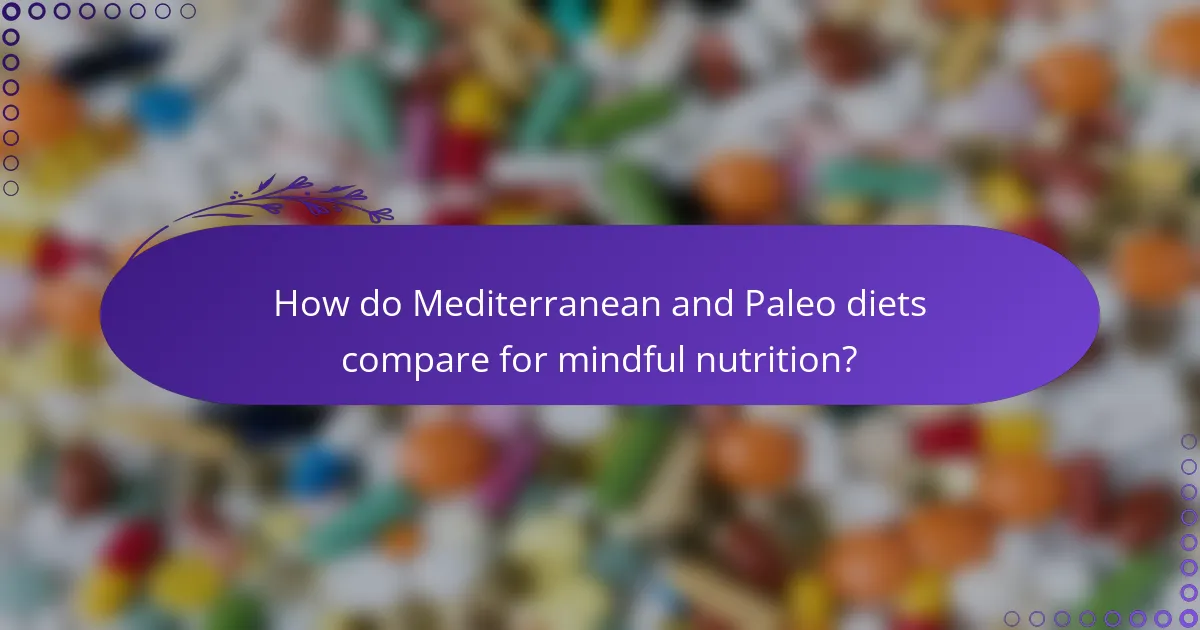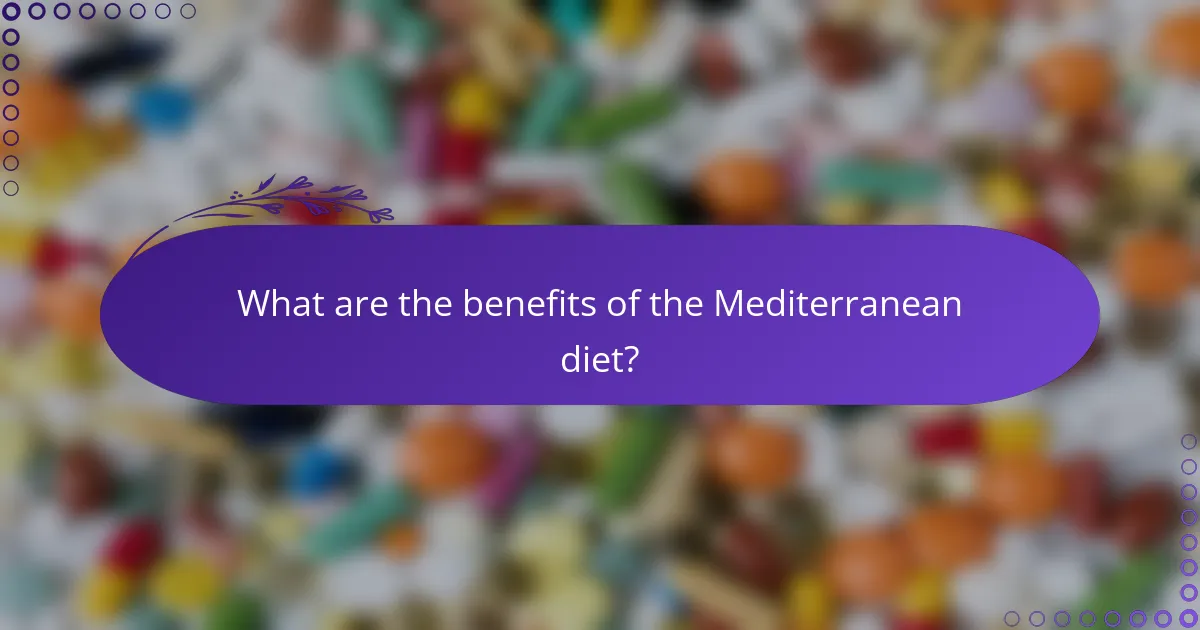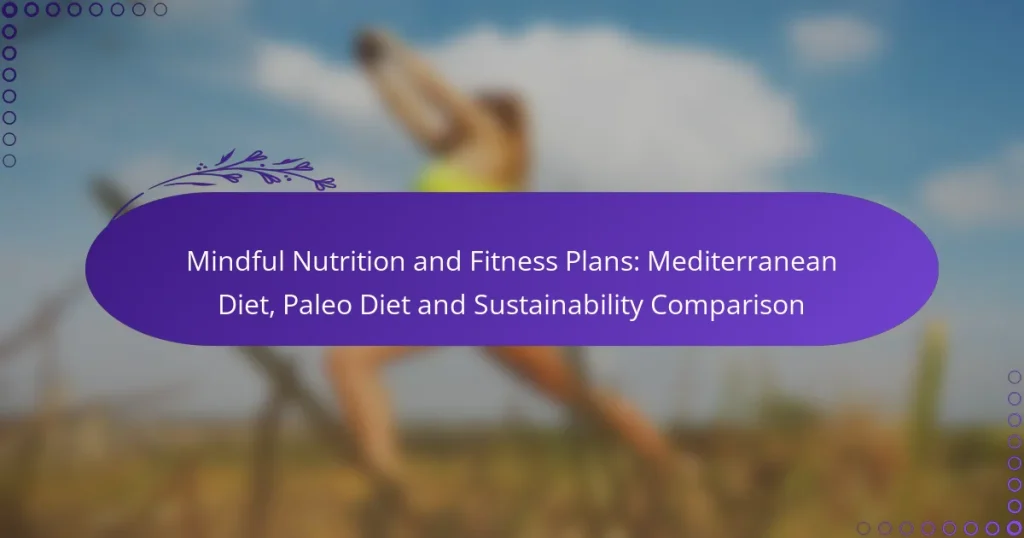Mindful nutrition plays a crucial role in both the Mediterranean and Paleo diets, each offering unique approaches to healthy eating. The Mediterranean diet champions whole, plant-based foods and healthy fats, while the Paleo diet emphasizes foods believed to be consumed by our ancestors, such as lean meats and nuts. Both diets promote overall wellness but differ in their food sources and underlying philosophies, making them distinct options for those seeking sustainable nutrition and fitness plans.

How do Mediterranean and Paleo diets compare for mindful nutrition?
The Mediterranean and Paleo diets both promote mindful nutrition but differ significantly in their food sources and philosophies. The Mediterranean diet emphasizes whole, plant-based foods, while the Paleo diet focuses on foods presumed to be available to our ancestors, such as lean meats and nuts.
Mediterranean diet emphasizes whole foods
The Mediterranean diet is rooted in the traditional eating patterns of countries bordering the Mediterranean Sea. It prioritizes whole foods like fruits, vegetables, whole grains, legumes, nuts, and healthy fats, particularly olive oil. This diet is rich in antioxidants and fiber, which contribute to overall health.
Meals are often centered around fresh ingredients, with an emphasis on seasonal produce. This approach not only enhances flavor but also encourages sustainable eating practices by reducing reliance on processed foods.
Paleo diet focuses on ancestral eating
The Paleo diet advocates for a return to the eating habits of our hunter-gatherer ancestors. It includes foods such as lean meats, fish, eggs, fruits, vegetables, nuts, and seeds while excluding grains, legumes, dairy, and processed foods. This diet aims to align modern eating with what humans evolved to consume.
By avoiding processed foods, the Paleo diet seeks to reduce inflammation and improve metabolic health. However, it can be restrictive, which may pose challenges for long-term adherence.
Both promote healthy fats and proteins
Both the Mediterranean and Paleo diets emphasize the importance of healthy fats and proteins. The Mediterranean diet includes sources like olive oil, fatty fish, and nuts, which provide essential fatty acids and promote heart health. Similarly, the Paleo diet encourages protein intake from lean meats and fish, which are vital for muscle maintenance and overall health.
Incorporating these healthy fats and proteins can help with satiety and energy levels, making both diets effective for weight management when followed properly.
Differences in carbohydrate sources
A key difference between the Mediterranean and Paleo diets lies in their carbohydrate sources. The Mediterranean diet includes whole grains, legumes, and fruits, which provide complex carbohydrates and fiber. These foods support digestive health and provide a steady energy supply.
Conversely, the Paleo diet excludes grains and legumes, relying on fruits and vegetables for carbohydrates. This can lead to lower carbohydrate intake, which may not be suitable for everyone, especially those with high energy needs.
Impact on sustainability and health
Both diets have implications for sustainability, but the Mediterranean diet is often viewed as more environmentally friendly. Its focus on plant-based foods and local produce can reduce carbon footprints and promote biodiversity. Additionally, the Mediterranean diet has been linked to numerous health benefits, including reduced risk of chronic diseases.
The Paleo diet, while promoting whole foods, may have a higher environmental impact due to its emphasis on meat consumption. Sustainable sourcing of animal products is crucial for minimizing this impact. Both diets can be adapted to support health and sustainability, but mindful choices are essential.

What are the benefits of the Mediterranean diet?
The Mediterranean diet offers numerous health benefits, emphasizing whole foods, healthy fats, and plant-based ingredients. This dietary pattern is linked to improved overall health, particularly in areas such as heart health, weight management, and longevity.
Rich in antioxidants and healthy fats
The Mediterranean diet is abundant in antioxidants and healthy fats, primarily from sources like olive oil, nuts, and fish. These foods help combat oxidative stress and inflammation in the body, which can reduce the risk of chronic diseases.
Incorporating a variety of colorful fruits and vegetables, such as tomatoes, spinach, and berries, enhances the antioxidant content. Aim for at least five servings of fruits and vegetables daily to maximize these benefits.
Supports heart health and longevity
This diet is well-known for its positive effects on heart health, largely due to its high content of omega-3 fatty acids and fiber. Regular consumption of fish, whole grains, and legumes can lower cholesterol levels and improve blood pressure.
Research suggests that following the Mediterranean diet may reduce the risk of heart disease by up to 30%. For practical application, consider replacing red meat with fish or poultry a few times a week.
Promotes weight management
The Mediterranean diet can aid in weight management by emphasizing whole, unprocessed foods that are nutrient-dense and satisfying. This approach encourages mindful eating, which can help prevent overeating.
To effectively manage weight, focus on portion control and balance. Incorporate healthy snacks like nuts or yogurt, and limit processed foods high in sugars and unhealthy fats. Regular physical activity complements this dietary approach for optimal results.

What are the benefits of the Paleo diet?
The Paleo diet offers several benefits, including promoting whole food consumption and potentially enhancing metabolic health. By focusing on foods that our ancestors would have eaten, it encourages a lifestyle that may lead to improved overall wellness.
Encourages whole, unprocessed foods
The Paleo diet emphasizes the consumption of whole, unprocessed foods such as lean meats, fish, fruits, vegetables, nuts, and seeds. This focus helps eliminate refined sugars, grains, and artificial additives, which can contribute to various health issues.
By prioritizing natural foods, followers of the Paleo diet often experience better nutrient intake and improved satiety, which can aid in weight management. Simple swaps, like choosing fresh vegetables over packaged snacks, can make a significant difference.
May improve metabolic health
Adopting the Paleo diet may lead to improvements in metabolic health markers, such as blood sugar levels and cholesterol profiles. The reduction of processed carbohydrates and sugars can help stabilize insulin levels, which is beneficial for those at risk of type 2 diabetes.
Many individuals report increased energy levels and reduced cravings when following this dietary approach. However, it’s essential to monitor personal responses and consult with a healthcare provider, especially for those with pre-existing conditions.
Supports muscle growth and recovery
The Paleo diet provides ample protein sources, including lean meats and fish, which are crucial for muscle growth and recovery. Adequate protein intake supports muscle repair after workouts, making it a suitable option for those engaged in regular physical activity.
Incorporating nutrient-dense foods like sweet potatoes and leafy greens can further enhance recovery by supplying necessary vitamins and minerals. For optimal results, aim to consume a balanced meal containing protein and carbohydrates within a couple of hours post-exercise.

How do these diets impact sustainability?
The Mediterranean and Paleo diets have distinct impacts on sustainability, primarily due to their sourcing and consumption patterns. The Mediterranean diet emphasizes local, seasonal foods, while the Paleo diet’s reliance on meat raises concerns about environmental effects.
Mediterranean diet promotes local sourcing
The Mediterranean diet encourages the use of locally sourced ingredients, which reduces transportation emissions and supports local economies. Staples include fruits, vegetables, whole grains, and legumes, often grown in the region.
By prioritizing seasonal produce, this diet not only enhances flavor but also minimizes the carbon footprint associated with out-of-season imports. For example, enjoying tomatoes in summer rather than winter can significantly lower environmental impact.
Paleo diet’s meat consumption concerns
The Paleo diet typically includes high amounts of meat, which can lead to increased greenhouse gas emissions compared to plant-based diets. Livestock farming is resource-intensive, requiring large amounts of water and land.
Choosing sustainably sourced meats, such as grass-fed or pasture-raised options, can mitigate some environmental concerns. However, even with these choices, the overall meat consumption in a Paleo diet may still pose sustainability challenges.
Environmental impact of food choices
Food choices directly influence environmental sustainability, with plant-based diets generally having a lower impact than meat-heavy diets. For instance, producing vegetables typically requires less water and land than raising livestock.
To improve sustainability, individuals can focus on reducing meat consumption, selecting seasonal produce, and minimizing food waste. Simple actions, like meal planning and composting, can further enhance the positive impact of dietary choices on the environment.

What should I consider when choosing a diet?
When choosing a diet, consider your personal health goals, lifestyle, and dietary preferences. It’s essential to evaluate how well a diet aligns with your nutritional needs and sustainability practices.
Mediterranean Diet
The Mediterranean Diet emphasizes whole foods, including fruits, vegetables, whole grains, nuts, and healthy fats like olive oil. This diet is known for its heart-healthy benefits and is often linked to lower risks of chronic diseases.
To adopt this diet, focus on incorporating a variety of plant-based foods while limiting red meat and processed foods. Aim for meals rich in omega-3 fatty acids, such as fish, and enjoy moderate portions of dairy, preferably yogurt or cheese.
Paleo Diet
The Paleo Diet is based on foods presumed to have been eaten by early humans, focusing on lean meats, fish, fruits, vegetables, nuts, and seeds while avoiding processed foods, grains, and dairy. This diet promotes a return to natural eating patterns.
When following the Paleo Diet, prioritize high-quality, organic, and grass-fed options where possible. Be mindful of the potential for higher costs and ensure you are getting a balanced intake of nutrients, particularly calcium and fiber, which may be lower without dairy and grains.
Sustainability Comparison
When comparing the sustainability of the Mediterranean and Paleo diets, the Mediterranean Diet generally scores higher due to its emphasis on plant-based foods and lower meat consumption. Sustainable practices include sourcing local produce and reducing food waste.
Consider the environmental impact of your food choices. For example, the Mediterranean Diet encourages seasonal eating and local sourcing, which can significantly reduce your carbon footprint. In contrast, the Paleo Diet’s reliance on animal products can lead to higher environmental costs.


